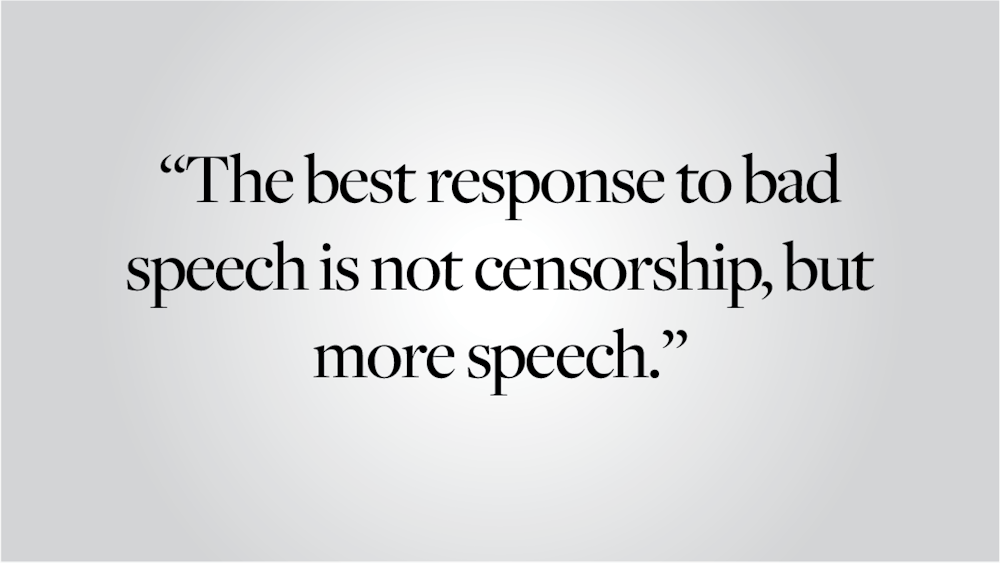On Feb. 2, as part of a protest for Brown to divest from “companies which profit from human rights abuses in Palestine,” hundreds of students on the Main Green chanted: “Yemen, Yemen, make us proud, turn another ship around!”
Over the past several months, Iran-backed Houthi rebels in Yemen have hijacked and fired missiles at dozens of commercial and military ships in the Red Sea, including American vessels. Ostensibly working to advance the Palestinian cause, the Houthis only claim to target ships that are Israeli-owned or heading to Israeli ports. Even if this claim were true (which it isn’t), Houthi actions “have endangered mariners, disrupted the free flow of commerce and interfered with navigational rights and freedoms,” according to the U.S. Department of State. Just weeks ago, two U.S. Navy SEALS died trying to prevent additional Houthi attacks. On Jan. 17, the Biden Administration announced the redesignation of the Houthis as a terrorist organization.
Some other details about the Houthis: The Houthis are backed by Iran and Hezbollah. Houthi leaders have forced thousands of Yemeni civilians into slavery and have relentlessly abused religious minorities in Yemen. On Feb. 8, the Houthis sentenced 13 civilians to death on charges of homosexuality. In 2003, the Houthis instituted a new slogan: “God is great, death to the U.S., death to Israel, curse the Jews, and victory for Islam.”
This is the group making some students at Brown “proud.”
I do not believe student protests, like the one on Feb. 2, should be shut down. Free expression and open debate are the lifeblood of a university, and any effort to suppress speech, no matter how hateful, sets an incredibly dangerous precedent. The best response to bad speech is not censorship, but more speech.
So I am speaking. I am appalled by the actions and sentiments I have witnessed on this campus. I am shocked that, just one week ago, hundreds of my peers chanted in support of a terrorist organization whose stated mission statement is to “curse the Jews” and eliminate the singular Jewish state in the world — not to mention the United States.
After all, the “Yemen” chant mirrors other rhetoric by the pro-Palestinian movement on Brown’s campus since Oct. 7. Activists have taken inspiration from Students for Justice in Palestine’s national chapter, which called Hamas’ Oct. 7 terror attack a “historic win for the Palestinian resistance.” Led by Brown’s chapter of SJP, fifty student organizations at Brown signed onto an Oct. 11 statement pledging solidarity with “Palestinian resistance” and holding “the Israeli regime and its allies unequivocally responsible for all suffering and loss of life, Palestinian or Israeli.” During an Oct. 13 protest, a Brown student declared “glory to our martyrs” — a slogan from the national SJP chapter’s materials. And in the wake of The New York Times’ gutwrenching report on Hamas’ mass sexual violence against Israeli civilians, primarily women, Brown’s Graduate Labor Organization accused “Zionist propaganda” of “(weaponizing) the language of ‘women’s rights.’”
What happened to “believe all women”? What happened to “terrorism is bad”? What happened to “equal treatment for all”? No movement justifies one’s disassociation from universal moral values. Opposing Israel’s military operation in Gaza and campaigning for Palestinian rights should not and does not necessitate backing terrorist organizations and denying evidence of sexual violence. It is immensely troubling to see some Brown students acting otherwise.
I understand that many of my classmates believe Israel to be guilty of colonial oppression and genocide, and thus feel a moral imperative to fight back. I understand that many of them despise Israel and profoundly oppose Zionism. But can we draw a line in the sand? Defending the Houthis, Hamas and Oct. 7, not to mention dismissing the victims of sexual violence, is sickening under any circumstances. As three other students and I wrote last semester, Jews and Israelis have vastly diverse opinions on Israeli policy, and our support for the State of Israel does not preclude our criticism of its worst inclinations. I sincerely hope that the same is true for my peers on the other side.
Jillian Lederman ’24 can be reached at jillian_lederman@brown.edu. Please send responses to this opinion to letters@browndailyherald.com and other op-eds to opinions@browndailyherald.com.





